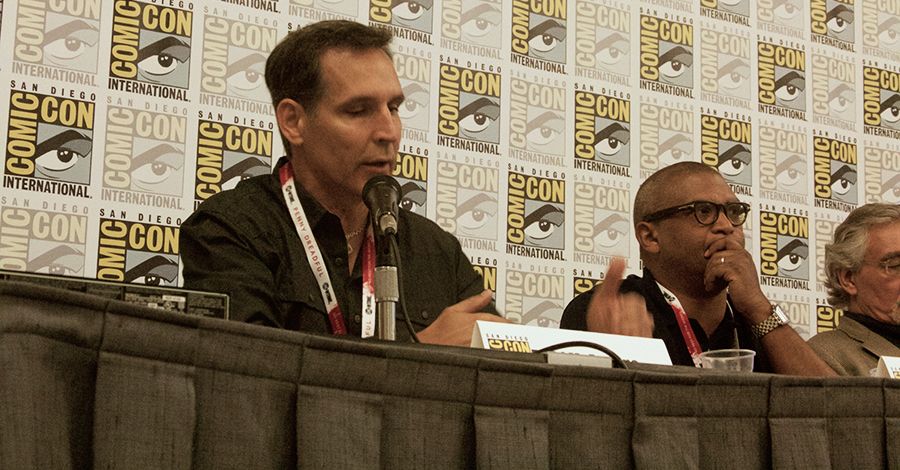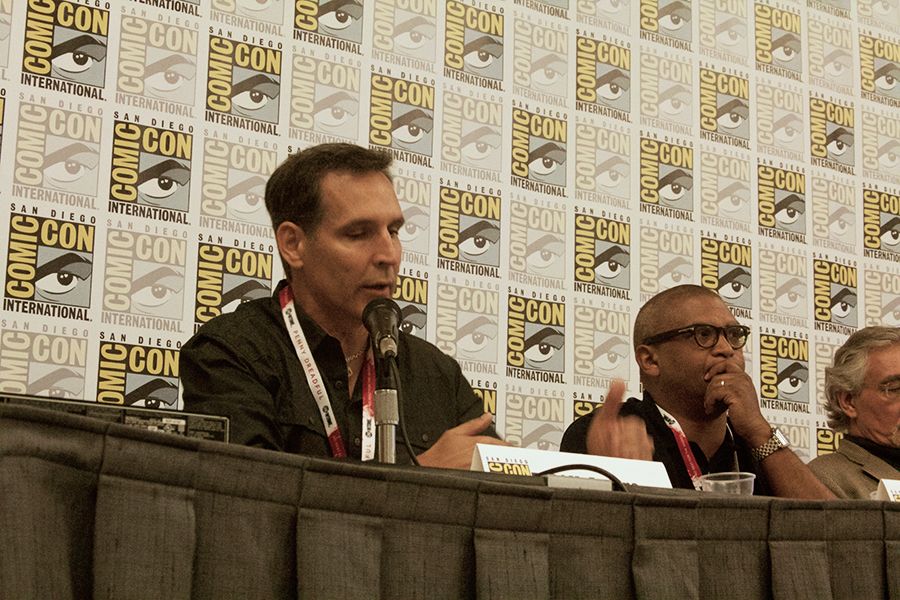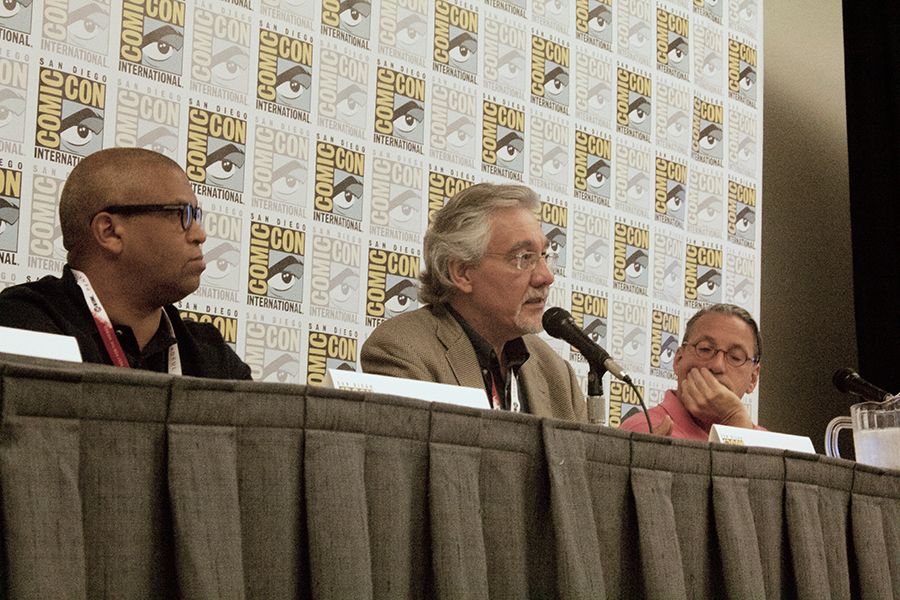On Thursday morning of Comic-Con International in San Diego, Mark Waid of Thrillbent hosted an all-star panel of industry veterans assembled to discuss how they spot and nurture talent, as well as their methods for cultivating a creative environment. His guests were celebrated artists and creators from comics and film, including Image Comics co-founder Todd McFarlane, film director and comic book writer Reginald Hudlin, CBLDF founder Denis Kitchen, designer Chip Kidd and current Image Comics publisher Eric Stephenson.
After introductions were made, Waid asked the panelists to discuss "what it takes to balance [nurturing young talent] with the needs and realities of publishing -- or any sort of creative endeavor -- in the long term."
Dennis Kitchen discussed the early days of Kitchen Sink Press, the publishing company he ran for almost thirty years. "I had the advantage and disadvantage of starting out as a one man operation," recalled Kitchen. "The good news is, I got to see a lot of the things that came in on 'the slush pile,' which is unsolicited submissions. Ninety-nine percent of it was unusable, which isn't to say it was all junk... it just wasn't appropriate. For example, I never did superhero comics, but I would constantly get submissions for superheroes. Know your target and don't waste your postage and don't waste your time if it's not something the publishers are looking for."
Even though he had to reject a great deal of material, Kitchen found some material through the submission pile, including Mark Schultz's Xenozoic Tales. Kitchen stressed the importance of appearance and cover letters when submitting material. "Pretend Chip Kidd is opening it and you want to dazzle him, " joked Kitchen.
Waid asked Eric Stephenson about the submission process at Image, and the publisher confirmed that he reviews all of the submissions. "Over the course of a week, I accumulate a huge pile of packages," explained Stephenson. "Usually at the end of the week I muster up the fortitude to actually go through it. As Denis said, a good ninety percent of it is inappropriate and unusable. It's easily one of the most disheartening parts of the job because an awful lot of material is just not ready."
CBR TV: Hudlin & Cowan Talk Milestone 2.0, Cultural Significance, Accessible Books & More
"What was the last thing you saw that gives you that little spark of, 'There's something here worth grabbing onto?'" asked Waid. "What do you do then?"
"We engage them," replied Stephenson. "One of the big questions if it's art, we want to know how long it took for that to be put together. You can put together a submission over the course of months and it may be beautiful, but if it took you months to get five or ten pages together, that's not really the timeline you put out monthlies on."
When Waid shifted the focus to McFarlane, the "Spawn" creator raised his hand and said, "No lie -- I was one of those kids that wasted his postage on superhero stuff and sent it to Denis... I sent out about 700 packages over the course of about three years and got about 300 rejection letters -- but the upside was that I got a lot of autographs," joked McFarlane.
"People will show you a book, like Eric was saying, that they've pencilled, inked, colored, lettered, and wrote," continued McFarlane. "The chances of you being professionally ready in all five of those categories at once is very nominal. You may be a hell of a penciller, but your inking may be deficient. "
Arguing in favor of splitting a submission into steps, McFarlane said, "You give yourself a chance to try out arguably for five jobs and not just go, 'If you don't like the complete package, I'm out.'"
Waid asked Chip Kidd what role nurturing talent played in his life. "In a sense, I represent corporate publishing," he said, noting that Pantheon, the book publishing company where Kidd works with graphic novels, is owned by Random House. He explained his history as starting off in Art Direction when Pantheon was publishing Art Spiegelman's "Maus." Kidd then became instrumental in bringing Ben Catcher and Chris Ware to Pantheon's attention. "My job became convincing the Random House sales force and editorial board that we should be doing this," said Kidd.
"It wasn't easy," he noted. "but they went along with it." He then touched upon the difference between corporate and independent publishing, saying, "We're in an ivory tower. We have no quotas. I have major respect for you guys."
Hudlin then spoke about how he broadened his career to include the title of "executive." "I'd been making movies and TV shows for some time when I got this call from a corporate headhunter who said, 'We're looking for someone to run B.E.T., which is the largest black media company in the world. Would you be interested?' I had never been an executive before, so I said sure!
Todd McFarlane Talks Paul Jenkins' "Spawn" Takeover, Latest on Film and Animation
"It was essentially a really well financed start-up," continued Hudlin. "They had not done original programming before, but they had incredible brand awareness. The catch was, no one at the company was in the business of original product. I had to build an operation from scratch. It's really great to do all the jobs. And if you're a creative, it's great to be an executive and if you're an executive, you should write and draw something. Learn every aspect of what you are passionate about because you will ultimately be a better collaborator."
Hudlin then laughed and stated, "An executive is a guy with a desk full of problems. And if you can take one of those problems off his desk, you're a hero."
Waid noted that the five creators on the panel are great representatives because they are creatives but also make corporate decisions.
"Here's what's tough if you're not a creative person," said McFarlane. "You have to understand that all creative people, to some extent, are neurotics. We self doubt our art work, our writing, everything we do. The greatest invention in the world is a thing called a deadline, because otherwise we'd noodle the one piece forever and then we'd die."
Waid then steered the conversation from recognizing talent toward nurturing it. "Is it difficult to find the line between being an editor and being a creator? How do you give advice to someone?" he asked Kitchen.
"You have to be honest on one hand, but you have to be a bit of a cheerleader," answered Kitchen. "When I started as a cartoonist and became a publisher, I was fortunate early on to work with Will Eisner. He nurtured me as a businessman. I was a hippie. I didn't want to do contracts. 'That's very good, and I trust you' [Eisner] said, 'but if you get hit by a bus tomorrow my wife can't rely on that.' In the end, a good contract protects both parties, and that's a concept I didn't get when I was young," Kitchen noted that he had problems with a previous company in regards to accounting, so he makes sure that he is meticulous with financial transparency with his clients.
Eric Stephenson said that editorial's role at Image is to be supportive of their collaborators. "When someone comes to Image with a specific vision for what they want, we help them do that," said Stephenson. "We facilitate, we give advice, we give support, but at the end of the day we don't dictate what they do."
"What does it take to be a decision maker?" asked Waid. "What bit of advice guides you?"
"Never get married and fall in love with any decision you make," answered McFarlane, "because in two months, it might be wrong or outdated."
"Particularly in film and television there are budget limitations, but there's no imagination limitations," said Hudlin. "How can you create your way out of a problem? If you apply that same level of creativity to business, you can create great business opportunities as well."
SDCC: Eric Stephenson Talks Image Comics, Creator-Owned & Creative Inspirations
Kitchen added, "Too often a creator thinks too hard about the perceived audience. My first advice is just to make it as good as you can make it."
"I keep hearing 'who's the target audience?'" said Kidd. "Our audiences are not targets. We are not shooting at them." Everyone laughed.
Waid closed with a story about editing an older artist during his time with DC editorial. "He had sort of passed his prime, but I still liked his work. I asked Dick Giordano about it -- 'What is it about this? I know it's not great work, but I really connect with it and I want to read more.' Dick said, 'Because you can tell that he would do this for free and he's not doing it for the paycheck.' You've got to love what you do, and if the sincerity of what you do is not there, then it shows. And you may be sincere to an audience of ten. It may not be the audience you want, but those people will always be your audience."



